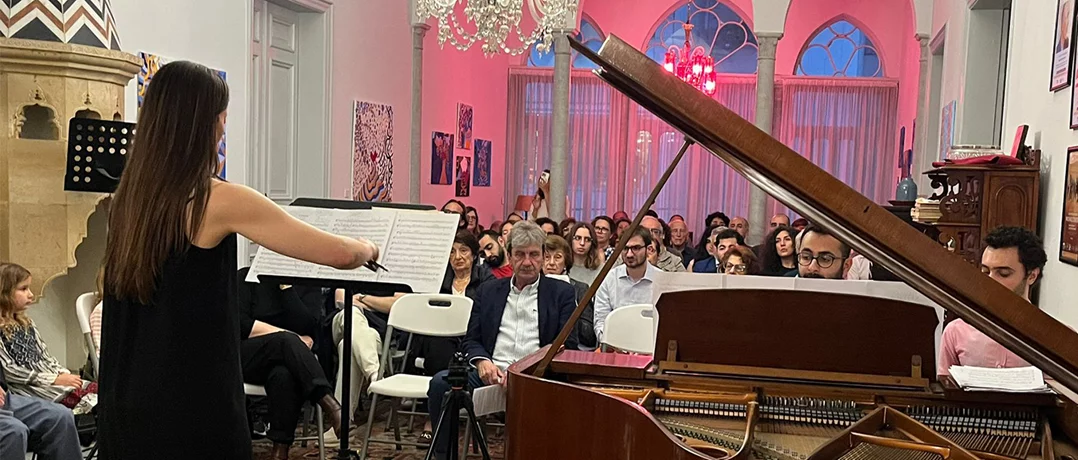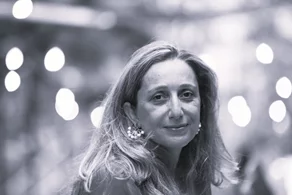In the wake of Beirut’s port explosion, Zeina Saleh Kayali created Beit Tabaris to preserve and promote Lebanon’s musical identity through education and performance.
Rebuilding with rhythm: Zeina Saleh Kayali’s mission to preserve Lebanese musical heritage
Rebuilding with rhythm: Zeina Saleh Kayali’s mission to preserve Lebanese musical heritage


It takes, above all, passion and generosity to undertake what Zeina Saleh Kayali began just after the Beirut port explosion, transforming her family home in the Tabaris neighborhood of Achrafieh, damaged by the blast, into an artist residence.
"With the 2019 crisis, young Lebanese musicians, those with a certain level of skill, could no longer travel abroad for advanced training. These are people who had studied music for 8, 10, even 12 years, and they used to have the means to refine their craft in Europe, especially in France. So, I thought to myself, why not bring to Lebanon what they can no longer go seek elsewhere," Zeina Saleh Kayali tells The Beiruter.
To restore the Beirut house, now named Beit Tabaris, she sold a property in London, enlisted architect Joseph Maroun, and oversaw six months of renovation. “We had to rebuild the house, make it comfortable, while preserving its old-world charm. This is where the artists, French and Franco-Lebanese, stay. This is where the masterclasses take place, and often, the concerts too. We have the exact space for 97 chairs,” she says, adding, “At first, the project was entirely funded by patronage, now I receive subsidies.”
For the furnishings, she restored what could be salvaged after the explosion and brought over pieces from her father’s home in London. In 1978, during the Lebanese War, the family had relocated to the UK, taking with them furniture, chandeliers, carpets, and a piano from Lebanon. After the 2020 blast, the journey was reversed.
My father always wanted to return to Beit Tabaris, he repeated it endlessly, but he never made it back. He died of Covid abroad in 2021
She hopes the artist residence she created serves as a tribute to her parents, both lovers of music, her father played the piano and her mother sang, passing on to her their shared passion for music and rhythm.
Nurturing Lebanon’s young musicians and preserving a rich musical heritage
Beit Tabaris opened its doors in May 2022. Since then, seven masterclasses are held each year, each welcoming 6 to 7 students. They come from all across Lebanon, Tripoli, Saida, Zahle, Anjar, Koura, Nabatieh.
Each masterclass concludes with a concert. For the fall season, four concerts are scheduled. The season in Beit Tabaris opened on Thursday, September 25, with a recital by Fernando Afara’s vocal class, accompanied by pianist Olga Bolun at nearby Saint Maroun Church. Twenty young singers performed opera arias, from Purcell to Puccini.
Zeina Saleh Kayali also organizes “Les Musicales du Liban” in Paris every June, November, and December since 2019. “We’re now in our seventh edition, and we have never stopped, not even during the Covid pandemic,” she says. Concerts are held at various venues in Paris, including Notre-Dame du Liban and the Institut du Monde Arabe.
This year, to mark the 20th anniversary of Toufic El-Bacha’s death, the festival will pay tribute to Abdelrahman’s father. His son and grandchildren will perform his symphonies and compositions
Zeina Saleh Kayali, who has worked for 20 years on documenting Lebanon’s musical heritage, has introduced the country’s musicians to the public through her books. She is currently completing a study on Zaki Nassif.
“It was in France that I first discovered Lebanese musicians like Zad Moultaka, Gabriel Yared, Naji Hakim, Béchara el-Khoury,” she says. Then came the earlier figures, like Wadih Sabra, the founder of Lebanon’s conservatory. “He’s the founding father of classical Lebanese music. Born in 1876, he died in 1952. He trained in France and was the first to do so in the 1870s, at the end of the 19th century. He founded the conservatory. In 1910, he established the very first small music school called Dar el Moussika, which became the National Conservatory in 1925. He was the first to adapt Western classical music tools to the Eastern soul. He took Eastern melodies, like traditional folk tunes, and kind of Westernized them,” she explains.
Later came figures like Georges Baz, Toufic Succar, the Fleyfel brothers, pioneers of Lebanese military music, and of course Toufic el-Bacha, whose Oriental Symphony, was never performed in Lebanon.
“Music and culture are not just entertainment,” Zeina Saleh Kayali insists. “They build identity. Our Lebanese classical music, even if not entirely classical, unites us. It is a force for cohesion. Our musical heritage is non-sectarian, apolitical. It is a unifying factor, and it deserves greater recognition”.


